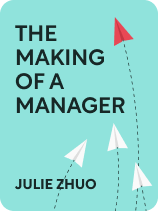

This article is an excerpt from the Shortform book guide to "The Making of a Manager" by Julie Zhuo. Shortform has the world's best summaries and analyses of books you should be reading.
Like this article? Sign up for a free trial here .
Are you wondering how to hire the right person? What kind of person does your company need to succeed?
A critical element of team building is hiring the right people. According to Julie Zhuo in The Making of a Manager, building a successful team will help empower your company’s vision.
Below, you’ll learn the key to hiring people that are fit for your team.
Hiring the Right People
Zhuo says great managers consistently hire people with the skills and commitment the team needs to advance company objectives. As the manager, it’s ultimately up to you to build a winning team, even if you have other staff members helping you. Therefore, it’s important to have a reliable process in place. Let’s first look at how to hire the right person by identifying and interviewing candidates. Then, we’ll cover the steps for evaluating and selecting candidates.
(Shortform note: The financial impact bad hires can have for a business underscores Zhuo’s emphasis on the importance of hiring well. According to research, a bad hire can cost a company up to 30% of the employee’s annual wages in added expenses (extra training, additional supervision time, and so on). Therefore, if an employee earns $80,000 per year, your company’s added expense might be $24,000: Research shows that managers have to spend 17% of their time supervising poorly-performing employees, which equates to nearly a full wasted day per week that could be spent on more productive tasks.)
How to Identify and Interview Candidates
Zhuo recommends making a hiring plan: a list of roles you need to fill over the next year based on your company’s goals and vision as well as deficiencies among your current team. A one-year hiring plan will help you clarify the skills and experiences you’ll need future team members to have and when you’ll need to have those positions filled.
Once you start your hiring efforts, Zhuo recommends these steps to find and interview candidates:
Step #1: Create a clear job description. Clarify core job duties, and be specific about the skills, experiences, and qualities you need. For example, if you need a project manager who’s detail-oriented and great at calmly navigating difficult conversations with strong personalities, be sure you note that preference.
Step #2: Decide where you’ll look for candidates. Zhuo recommends asking colleagues for recommendations before looking anywhere else. If none of their suggestions work out, you now have an idea of what kind of person to look for elsewhere.
Step #3: Prepare a template of interview questions. Be clear about what you want to learn, and use the same questions for each candidate interviewing for a single role. As Zhuo says, this helps you compare candidates based on the quality of their answers rather than subjective impressions.
Step #4: Invite colleagues to help you conduct interviews. According to Zhuo, this can diminish bias that often interferes when only one person is involved and can help you catch warning signs you might overlook if you’re on your own—for example, a candidate who won’t make eye contact with female interviewers.
Step #5: Conduct memorable interviews. Avoid distractions and devote your attention to candidates so they know you consider them a priority. Also (if you think they’re likely to be a good hire), describe the difference you see they’ll make when they’re on your team, and tell them how excited you are to welcome them to the company. As Zhuo says, you need to make sure candidates see your company as an attractive place to work.
How to Evaluate and Select Candidates
After you’ve interviewed candidates, how do you decide who to hire? Zhuo suggests you take these steps to hire the right person:
Step #1: Review work they’ve done in the past. Evaluate a few projects they’ve completed that are similar to the work they’ll be expected to do at your company. According to Zhuo, this will give you a clear sense of their skills and ability to problem solve. It’ll also help you forecast how they’ll perform in the future.
Step #2: Ask trusted peers for input. Zhuo says you likely won’t get useful input from references a candidate furnishes. Instead, seek input from colleagues and peers in your professional network who’ll give you an honest assessment of candidates.
Step #3: Go with candidates who excite you. Even if a candidate has the needed skills and qualities, don’t choose them just because they could fit. Zhuo says to always give preference to candidates who spark enthusiasm in at least one interviewer. Candidates are more likely to add high value to your team when they stand out as unique.
Step #4: Prioritize diverse candidates. Hire candidates who have varied work and life experiences and who represent diverse races, genders, cultural backgrounds, and sexual orientations. Zhuo says diverse teams generate more creative ideas, solve problems more effectively, and produce superior outcomes.
Step #5: Choose people who have the potential to contribute beyond their designated role. Prepare for future growth by hiring candidates who are equipped to deliver more than you need immediately. For example, even if a frontline sales role doesn’t include supervisory responsibilities now, Zhuo says it’s wise to give an edge to candidates who have relevant sales experience and supervising experience. They’ll be able to step into bigger roles as your team grows.

———End of Preview———
Like what you just read? Read the rest of the world's best book summary and analysis of Julie Zhuo's "The Making of a Manager" at Shortform .
Here's what you'll find in our full The Making of a Manager summary :
- How to build a team and motivate them to work together
- How to run productive meetings
- Tips on how to interview and hire the right employees






